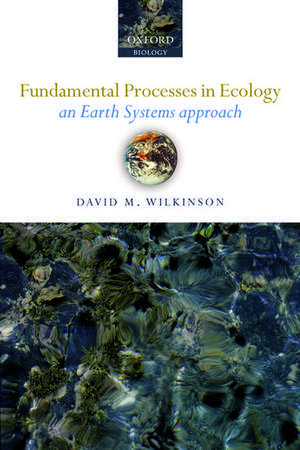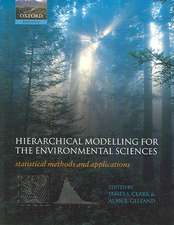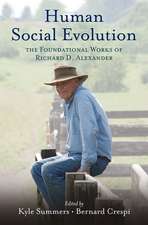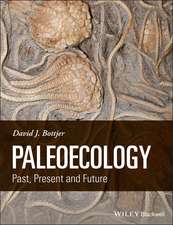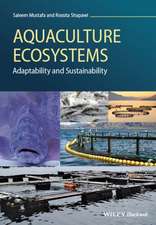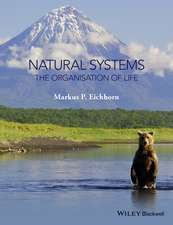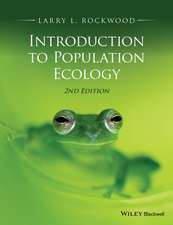Fundamental Processes in Ecology: An earth systems approach
Autor David M Wilkinsonen Limba Engleză Hardback – 10 aug 2006
Preț: 596.88 lei
Preț vechi: 798.30 lei
-25% Nou
Puncte Express: 895
Preț estimativ în valută:
114.21€ • 119.25$ • 94.53£
114.21€ • 119.25$ • 94.53£
Carte tipărită la comandă
Livrare economică 24-31 martie
Preluare comenzi: 021 569.72.76
Specificații
ISBN-13: 9780198568469
ISBN-10: 0198568460
Pagini: 200
Ilustrații: 12 line; 19 half tones
Dimensiuni: 160 x 241 x 15 mm
Greutate: 0.44 kg
Editura: OUP OXFORD
Colecția OUP Oxford
Locul publicării:Oxford, United Kingdom
ISBN-10: 0198568460
Pagini: 200
Ilustrații: 12 line; 19 half tones
Dimensiuni: 160 x 241 x 15 mm
Greutate: 0.44 kg
Editura: OUP OXFORD
Colecția OUP Oxford
Locul publicării:Oxford, United Kingdom
Recenzii
The unconventional theoretical perspective of this clearly written, concise volume will shed fresh light on areas of one's own interest. Readers will find his or her own surprises and illuminations. For me, the exclamation point was Wilkinson's list of fundamental guilds: autotrophs, decomposers, and parasites.
Wilkinson does a fine job explaining fundamental ecological processes such as energy flow, multiple guilds, carbon sequestration, etc...
...a stimulating text for a graduate seminar in ecology...
Fundamental Processes in Ecology is an intriguing but iconoclastic introduction ... [it] provides a novel and thought-provoking organizational framework for ecology.
This is a remarkable book at many levels ... Put simply, this should be seen as a key text in any undergraduate ecology/environment course. It's one of the most interesting texts published for some time - a must-buy for the library.
Wilkinson has succeeded in writing an extraordinarily readable and accessible book that examines some of the very basic questions underlying ecology in its widest sense. There are relatively few books that encourage the reader to shake free from the shackles of conventional thinking and move along new and illuminating paths. Wilkinson has achieved this, and his book deserves to be read, assimilated, and argued over by all those interested in ecology, from undergraduates to senior academics.
In this lucidly written book, Dave Wilkinson introduces the ecological building blocks needed for life to thrive on a planet and explains how a self-regulating 'Gaia' system can emerge from them.
This is a broad and wide ranging yet scrupulously scientific book on ecology. It is just what is needed for the understanding of the fast unfolding disaster of global climate change. I unhesitatingly recommend it to all concerned biologists and climate scientists.
Wilkinson does a fine job explaining fundamental ecological processes such as energy flow, multiple guilds, carbon sequestration, etc...
...a stimulating text for a graduate seminar in ecology...
Fundamental Processes in Ecology is an intriguing but iconoclastic introduction ... [it] provides a novel and thought-provoking organizational framework for ecology.
This is a remarkable book at many levels ... Put simply, this should be seen as a key text in any undergraduate ecology/environment course. It's one of the most interesting texts published for some time - a must-buy for the library.
Wilkinson has succeeded in writing an extraordinarily readable and accessible book that examines some of the very basic questions underlying ecology in its widest sense. There are relatively few books that encourage the reader to shake free from the shackles of conventional thinking and move along new and illuminating paths. Wilkinson has achieved this, and his book deserves to be read, assimilated, and argued over by all those interested in ecology, from undergraduates to senior academics.
In this lucidly written book, Dave Wilkinson introduces the ecological building blocks needed for life to thrive on a planet and explains how a self-regulating 'Gaia' system can emerge from them.
This is a broad and wide ranging yet scrupulously scientific book on ecology. It is just what is needed for the understanding of the fast unfolding disaster of global climate change. I unhesitatingly recommend it to all concerned biologists and climate scientists.
Notă biografică
David M Wilkinson is Reader in Environmental Science in the School of Biological and Earth Sciences at Liverpool John Moores University. He has wide interests within the environmental and biological sciences, where much of his research is on theoretical topics within evolutionary ecology, biogeography and Earth systems science. In addition he is involved in more empirical research on soil protozoa, environmental archaeology and the history of science. His teaching covers a diverse range of topics from the history of geology to forensic archaeology, but centres on various aspects of ecology.
